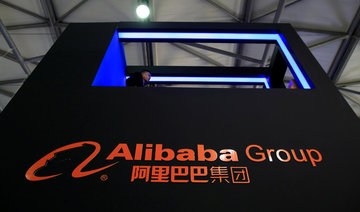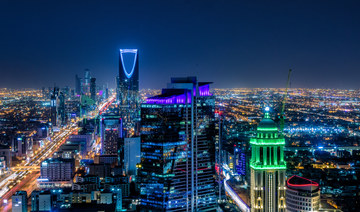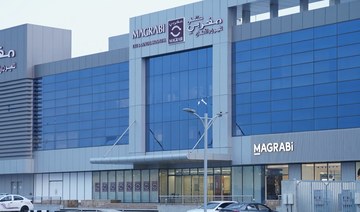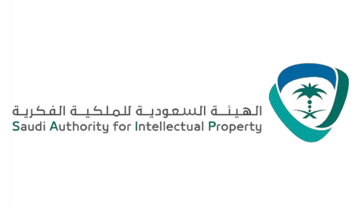PYEONGCHANG: For a major new Olympics sponsor, Japanese carmaker Toyota Motor Corp. is oddly invisible at the Pyeongchang winter Games.
Unlike other top global sponsors such as Coca-Cola and Visa, Toyota is nowhere to be seen, having sent only a few dozen representatives to South Korea for the event.
Its cars are missing from Olympic fleets, the logo is nowhere to be seen and only visiting Toyota officials from other countries such as the US, whose teams it separately sponsors, can wear Olympic rings on their clothing here.
That’s because Toyota realized before signing with the International Olympic Committee (IOC) almost three years ago that these Games, like the South Korean car market, would always belong to Toyota’s local rivals, Hyundai and Kia .
“Toyota felt that giving up some of our benefits from these partnerships at Pyeongchang 2018 was the right thing to do after conferring with the International Olympic Committee and International Paralympic Committee,” a Toyota spokesman said.
Toyota signed its nine-year deal with the IOC in 2015, after Pyeongchang was awarded the Games, the result of a 10-year campaign that had been backed by Hyundai and Kia which were already in separate sponsorship talks with local organizers.
Toyota still has the right as global IOC sponsor to use the Olympics logos in its advertising elsewhere in the world, and it did so prominently this month in two commercials during the US Super Bowl, when a 30-second ad can cost $5 million.
The Japanese firm’s marketing during the Pyeongchang Games, which formally opened on Friday, will be seen in 30 countries — though not in South Korea, a market where foreign carmakers have long struggled, especially those from Japan.
Instead, Hyundai and its affiliate Kia are making the most of their domestic sponsorship rights, having signed their own separate deals with the Pyeongchang Games organizing committee.
They have erected pavilions in Olympic venues to show off their latest-technology vehicles, including Hyundai’s hydrogen-fueled autonomous vehicles.
Hyundai, whose distinctive all-black pavilion was designed by British architect Asif Khan, has provided 4,100 cars and shuttle buses for the IOC to use for its VIPs and athletes.
Hyundai declined to comment.
The Pyeongchang organizing committee referred questions to the IOC, which said in an email to Reuters: “In the short term, we worked in partnership with Toyota to enable Pyeongchang to continue their local sponsorship agreement which will provide additional support to the local organizers.”
Toyota’s readiness to give up on sponsorship rights in South Korea underlines the tough nature of the market for foreigners, especially for exporters from Japan, a former colonial power that still inspires ill feeling among South Korean consumers.
Imported cars make up about 15 percent of the market, and these are mostly from European makers, South Korean industry data show. Toyota has been in the market since 2001 and its brands accounted for barely a tenth of imports last year.
Insisting on the domestic rights might not only have been futile from a marketing perspective, it could have backfired.
David Krysiek, chief executive of Atlanta-based brand communications firm Brandware, said Toyota avoided “the disastrous prospect of being seen as a carpet-bagger in Korea.”
Toyota can at least count on dominating at the next Olympics, the summer Games in Tokyo in 2020, but the one after that could prove tricky: the 2022 winter Olympics in Beijing.
China, parts of which were also colonized by Japan, is another auto market that is tough for Japanese firms, but it is the world’s largest and Toyota has no plans to take a step back from the domestic sponsorship rights, as it did in South Korea.
In 2012, Japanese car sales in China nose-dived during a flare-up in a territorial dispute between the two nations. Thousands of Japanese-brand cars were vandalized and mobs attacked dealerships in several cities.
Sentiment has since recovered, and Toyota has set an upbeat sales forecast in China for this year.
“Right now things are more or less back to normal, but we are still handicapped by the past,” said the head of a major Japanese carmaker’s China operations, speaking on condition of anonymity because of the sensitivity of the issue.
He said “normal” meant that about 10 percent of Chinese consumers would not contemplate buying a Japanese car.
Rob Prazmark, chief executive of 21 Sports & Entertainment Marketing Group, who helped create the IOC top sponsors program, said there was also little risk in China that Toyota would be seen to be gatecrashing a party meant for local carmakers.
“China has its own local auto industry but it’s not like what Hyundai and Kia means to Korea,” he said.
Toyota leaves Pyeongchang podium to South Korean rivals
Toyota leaves Pyeongchang podium to South Korean rivals
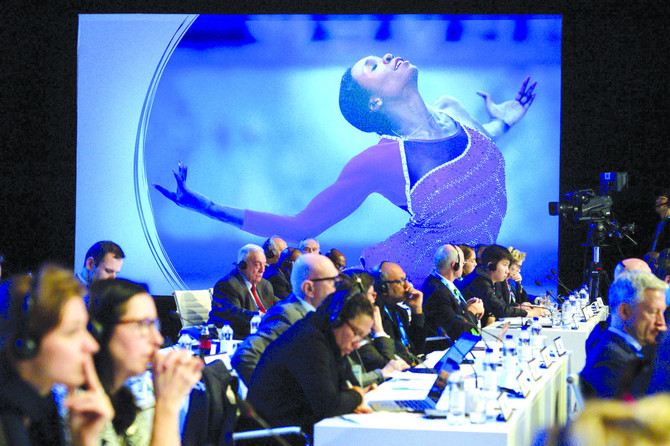
ACWA Power, IRENA join hands to accelerate global renewable energy transition
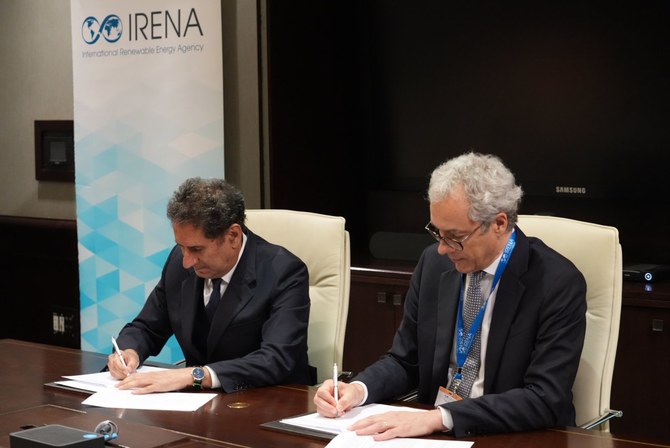
RIYADH: In a bid to add impetus to the adoption of clean energy sources worldwide, Saudi utility firm ACWA Power has signed a deal with the International Renewable Energy Agency, said a press release issued on Thursday.
The Saudi-listed firm said that the partnership aligns with its mission to provide sustainable energy solutions and seeks to accelerate the adoption and sustainable use of renewable energy across the globe.
ACWA Power will work closely with IRENA to share crucial insights on infrastructure investment in renewable energy, green hydrogen advancement, solar energy, smart grids, and the intersection of energy and water, the press release said.
The Saudi-listed company also announced its participation in various IRENA initiatives, such as Green Hydrogen, Collaborative Frameworks, Project Facilitation, the Alliance for Industry Decarbonization, the Utilities for Net-Zero Alliance, and the Coalition for Action.
As per the deal, ACWA Power and IRENA will investigate avenues to mobilize finance and investment for renewable energy projects, while also supporting infrastructure for the development, storage, distribution, transmission, and consumption of renewables.
Moreover, collaborative workshops and seminars will be arranged to exchange best practices, enhance skills, and promote awareness of the energy transition among youth, professionals, and the public using IRENA’s platforms and programs.
ACWA Power CEO Marco Arcelli said the partnership with IRENA marks a significant milestone in his company’s journey toward a sustainable energy future.
“By combining our strengths and resources, we are prepared to drive meaningful change and accelerate the transition to renewable energy on a global scale,” he said.
The CEO added that through collaborative partnerships and innovative solutions, ACWA Power remains committed to advancing the widespread adoption and sustainable use of renewable energy, shaping a brighter and more sustainable future for generations to come.
IRENA Director General Francesco La Camera commented: “We have less than a decade left to secure a fighting chance for a 1.5°C world. Accelerating the renewable-based energy transition needs industry leaders and this deal between IRENA and ACWA Power stands for the growing commitment of global industry to act on decarbonization.”
He added: “We need to act together to accelerate the sustainable use of renewables and green hydrogen across the globe.”
Closing Bell: TASI ends the week in green with trading turnover at $2.18bn
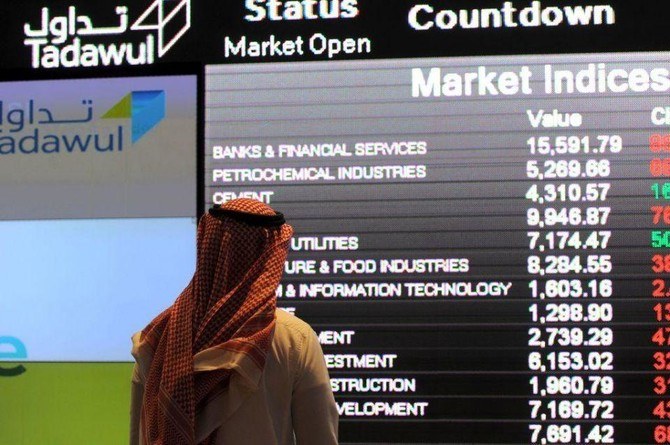
RIYADH: Saudi Arabia’s Tadawul All Share Index rose on Thursday, gaining 36.37 points, or 0.29 percent, to close at 12,502.35.
The total trading turnover of the benchmark index was SR8.19 billion ($2.18 billion) as 130 stocks advanced, while 90 retreated.
The MSCI Tadawul Index also increased by 5.98 points, or 0.38 percent, to close at 1,575.11.
The Kingdom’s parallel market, Nomu, followed suit and gained 305.77 points, or 1.16 percent, to close at 26,418.75. This comes as 33 stocks advanced, while as many as 27 retreated.
The best-performing stock on the main index was Saudi Arabian Amiantit Co., as its share price rose by 7.69 percent to SR30.80.
Allianz Saudi Fransi Cooperative Insurance Co. also performed well as its share price saw a 6.79 percent increase to close at SR20.16.
This comes as Abu Dhabi National Insurance Co. completed a strategic acquisition of a 51 percent stake in Allianz, according to the Emirates News Agency, WAM.
ADNIC Chairman Mohamed Al- Nahyan told WAM: “The connection between the UAE and Saudi Arabia is deep, mutually beneficial and ever-growing. At ADNIC, we see Saudi Arabia as a high-potential market which perfectly aligns with our overall growth strategy, and we are looking forward to unlocking new possibilities for growth and success.”
Other top performers include United Cooperative Assurance Co. and Saudi Pharmaceutical Industries and Medical Appliances Corp. whose share prices soared by 5.68 percent and 5.51 percent, to stand at SR11.16 and SR14.16 respectively.
The worst performer was Alkhaleej Training and Education Co., whose share price dropped by 5.27 percent to SR33.25.
On the announcements front, Saudi mining giant and Public Investment Fund subsidiary, Saudi Arabian Mining Co., known as Ma’aden, announced the launch of single stock options in a statement on Tadawul.
SSOs will enable local and international investors to effectively hedge and manage portfolio risks as well as diversify products available for trading in the market.
Saudi minister calls for ‘decisive financial policies’ to counter global economic uncertainties
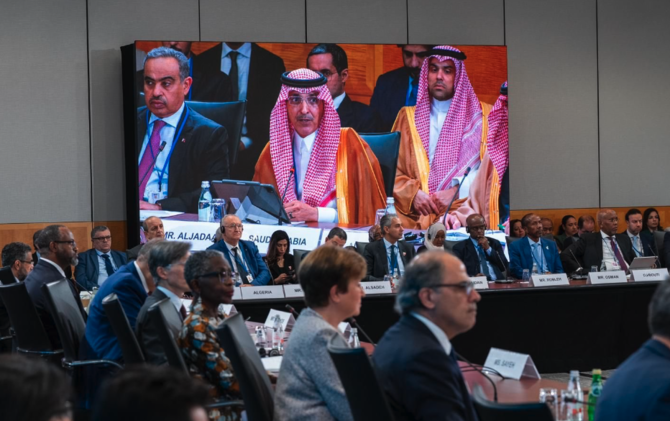
RIYADH: Saudi Arabia’s finance minister on Thursday stressed the need for “decisive financial policies” across the world to navigate through uncertain economic conditions.
Speaking during the Spring Meetings 2024 of the IMF held in Washington, D.C, Mohammed Al-Jadaan noted that such a decisive approach would bolster resilience and sustainability amid the ongoing uncertainties.
He was attending a meeting of finance ministers and governors of the Middle East, North Africa, Afghanistan and Pakistan region with IMF Managing Director Kristalina Georgieva.
“I also participated in the Global Sovereign Debt Roundtable, where I highlighted the importance of enhancing Comparability of Treatment by establishing a clear and fair framework that ensures equitable treatment among all creditors,” Al-Jadaan said in a post on X.
Additionally, the minister participated in the second G20 finance ministers and central bank governors’ meeting held under the Brazilian presidency in Sao Paulo. He emphasized that effective climate action required a holistic approach.
He said that can be achieved “by integrating diverse sectors acknowledging the diversity of solutions to address climate challenges, including using innovative technologies to manage emissions.”
Al-Jadaan also met with Jose Vinals, chairman of Standard Chartered Bank, to discuss the regional and global economic outlook.
He also met with Spanish Minister of Economy, Trade, and Business, Carlos Cuerpo to discuss ways to enhance relations between the two countries.
Moreover, Al-Jadaan held talks with Jean Lemierre, chairman of Bank BNP Paribas, the global head of Official Institutions Coverage, Laurent Leveque, and the head of Debt Capital Markets, Alexis Taffin.
They discussed progress made in Saudi Arabia, as well as issues related to attracting investment and alternative financing.
Magrabi opens new complex in Makkah
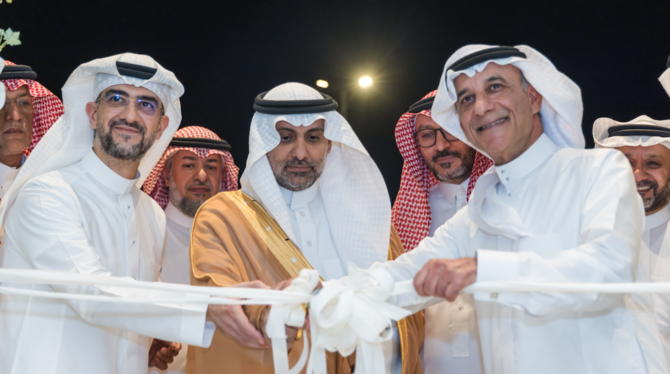
RIYADH: With a new branch in Makkah, Magrabi Hospitals and Centers are expanding to more Saudi cities to meet the growing demand for specialized ophthalmological and dentistry care.
Minister of Health Fahad Al-Jalajel inaugurated the medical complex and one-day surgery center in the holy city, accompanied by Magrabi Hospitals and Centers CEO Mutasim Alireza, the Group’s Deputy CEO and Cheif Operating Officer Abdulrahman Barzangi, and several officials and dignitaries.
Al-Jalajel underscored that the opening reflects the Kingdom’s commitment to enhancing the quality of its healthcare services and transitioning toward a more comprehensive and integrated medical system.
He further stated that this initiative is a vital component of the Health Transformation Program, a foundational aspect of Saudi Vision 2030, which has achieved significant milestones and advancements in the medical sector under the leadership of Crown Prince Mohammed bin Salman.
Following the official inauguration, the minister toured the complex’s facilities, noting its significance as a notable project and a valuable contribution to the Kingdom.
Alireza said: “This specialized medical complex underscores our commitment to being at the forefront of healthcare for ophthalmology and dental services and continuing our mission to offer specialized medical services that meet community needs with the utmost quality and safety.”
In March, Magrabi Ophthalmology and Dentistry Hospital Dammam officially opened its doors in Al-Shaala, marking an achievement for medical care in Saudi Arabia.
The Magrabi Dammam health facility is the largest specialized center in the region and provides sub-specialized services, meeting the highest quality standards and leveraging the latest global technologies.
UAE records 64% surge in trademark registrations
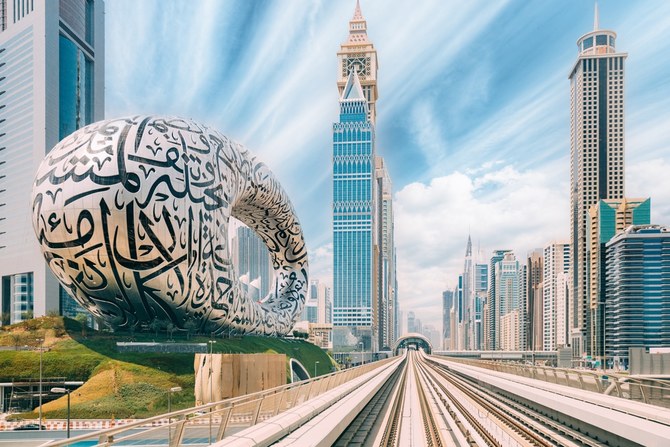
RIYADH: The UAE recorded an annual 64 percent surge in trademark registrations, amounting to 4,610 in the first quarter of 2024, official data showed.
The figures, released by the nation’s Ministry of Economy, reveal the notable increase from 2,813 signups in the same period of 2023.
March emerged as a particularly prolific period, with 2,018 new brands reported.
The trademarks registered during this time span a wide range of key sectors, including smart technology, transportation, food and beverage and pharmaceuticals as well as medical devices, finance, real estate, and more.
The preceding months of January and February collectively accounted for 2,592 trademarks, further highlighting sustained growth and momentum in registrations.
As the country continues to position itself as a global business hub, trademark registrations serve as a crucial indicator of economic vitality and innovation-driven growth.
In a release on X, the ministry noted on April 17 that it has: “Worked on developing the trademark registration service, using the latest technologies and innovative solutions to achieve higher efficiency and better interaction with clients.”
The UAE’s adherence to international treaties and agreements further strengthens its trademark registration regime.
By adhering to agreements like the Paris Convention for the Protection of Industrial Property and the Agreement on Trade-Related Aspects of Intellectual Property Rights or TRIPS, the UAE facilitates international trademark registration and enforcement, empowering businesses to broaden their operations across borders.
The nation has further established mechanisms for enforcing trademark rights and combating infringement.
These include civil remedies, such as damages, injunctions, and seizure of infringing goods, as well as criminal penalties for trademark counterfeiting and piracy.


